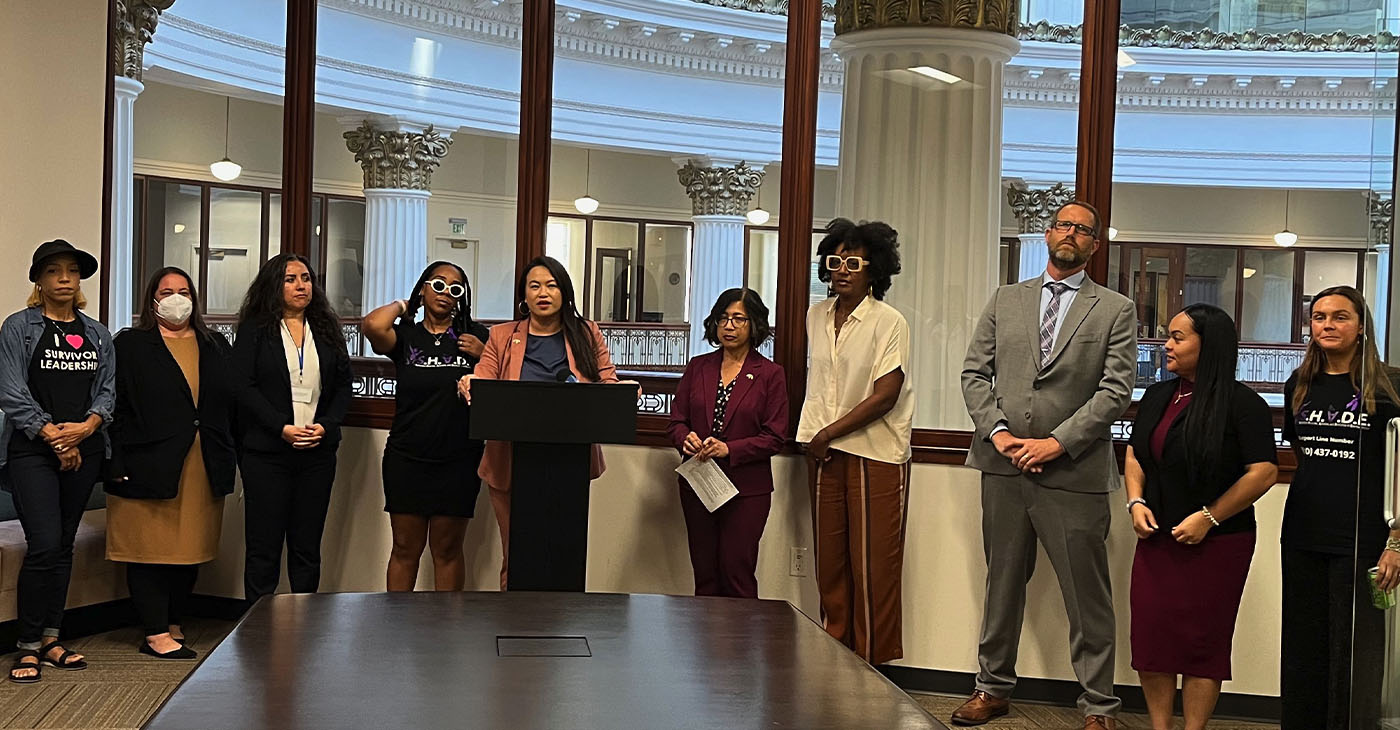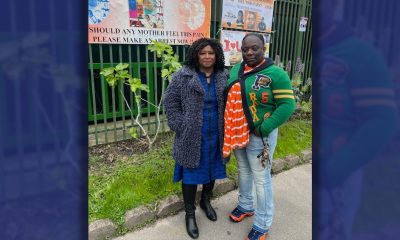Activism
Oakland Mayor Sheng Thao Launches Human Trafficking Advisory Council
Oakland Police Department, also a part of the advisory council, shared that in partnership with the FBI, they completed 26 critical investigations where 14 minors were rescued, 27 individuals were arrested for solicitation, and 14 individuals suspected of human trafficking were arrested.

By Magaly Muñoz, Post Staff
On Wednesday evening, Oakland Mayor Sheng Thao launched her Human Trafficking Advisory Council. Collaborating with several agencies, the council aims to devise strategies to prevent and investigate human trafficking crimes, as well as assist victims in healing from these crimes.
Thao was joined by City Council President Niki Fortunato Bas, the Alameda County District Attorney’s Office, the Oakland Police Department, the Oakland Department of Violence Prevention, the Alameda County Sheriff’s Department, and a coalition of survivor advocate groups and community organizations.
“It is our job as a whole community, as neighbors, as stewards of humanity to ensure that we are protecting our boys and girls, men and women, to ensure that they do not have to face a life of being trafficked,” Thao said.
Earlier this month, Alameda County District Attorney Pamela Price unveiled six new billboards at Oakland International Airport that are part of her campaign against human trafficking in the Bay Area.
The billboards will feature QR codes and phone numbers, offering victims and survivors access to helplines and resources. The information displayed on these billboards will be available in three languages.
Thao said they are looking into the option of putting up additional billboards around the city but will leave it up to the Council to find the best solutions to raising awareness about sex trafficking.
Alameda County is identified as the third-largest hub for sex trafficking in the country, with 4,700 youth victims.
“It [human trafficking] is a billion-dollar industry, and our efforts have to step up to that,” Price said during her press conference.
The council identified the streets and neighborhoods between International Boulevard, East 14th Street, and East 15th Street, also known as “the Blade,” as the most active zones for trafficking in Oakland.
Oakland Police Department, also a part of the advisory council, shared that in partnership with the FBI, they completed 26 critical investigations where 14 minors were rescued, 27 individuals were arrested for solicitation, and 14 individuals suspected of human trafficking were arrested.
When asked how she will ensure that the community doesn’t see an increase in police presence in the streets as a negative, Thao said there are two sides to the issue.
First, the role of police partnerships is to look out for pimps and perpetrators of sex trafficking and to enforce the relevant laws. Second, victims need resources like housing, jobs, and food. This is where community organizations come into play.
Venus Morris from Survivors Healing Advising and Dedicated to Empowerment (SHADE) shared that the isolation brought on by the COVID-19 pandemic made it easier to exploit people because of idle time that perpetrators’ had coupled with the lack of resources accessible to survivors and victims.
She said her work with SHADE goes towards diffusing the epidemic of sex trafficking and helping kids feel like selling their bodies and walking the streets is not the only option to getting some stability in their lives.
“Awareness isn’t a campaign. It’s an action,” Morris said.
The mayor stated that the council will regularly convene to discuss strategies concerning resources for victims, proper intervention and enforcement of these crimes, and examine the underlying issues that make victims vulnerable.
Activism
Oakland Post: Week of April 24 – 30, 2024
The printed Weekly Edition of the Oakland Post: Week of April 24 – 30, 2024

To enlarge your view of this issue, use the slider, magnifying glass icon or full page icon in the lower right corner of the browser window. ![]()
Activism
Oakland Post: Week of April 17 – 23, 2024
The printed Weekly Edition of the Oakland Post: Week of April 17 – 23, 2024

To enlarge your view of this issue, use the slider, magnifying glass icon or full page icon in the lower right corner of the browser window. ![]()
Activism
Oakland Schools Honor Fred Korematsu Day of Civil Liberties
Every Jan. 30, OUSD commemorates the legacy of Fred Korematsu, an Oakland native, a Castlemont High School graduate, and a national symbol of resistance, resilience, and justice. His defiant stand against racial injustice and his unwavering commitment to civil rights continue to inspire the local community and the nation. Tuesday was “Fred Korematsu Day of Civil Liberties and the Constitution” in the state of California and a growing number of states across the country.

By Post Staff
Every Jan. 30, OUSD commemorates the legacy of Fred Korematsu, an Oakland native, a Castlemont High School graduate, and a national symbol of resistance, resilience, and justice.
His defiant stand against racial injustice and his unwavering commitment to civil rights continue to inspire the local community and the nation. Tuesday was “Fred Korematsu Day of Civil Liberties and the Constitution” in the state of California and a growing number of states across the country.
One OUSD school is named in his honor: Fred T. Korematsu Discovery Academy (KDA) elementary in East Oakland.
Several years ago, founding KDA Principal Charles Wilson, in a video interview with anti-hate organization “Not In Our Town,” said, “We chose the name Fred Korematsu because we really felt like the attributes that he showed in his work are things that the children need to learn … that common people can stand up and make differences in a large number of people’s lives.”
Fred Korematsu was born in Oakland on Jan. 30, 1919. His parents ran a floral nursery business, and his upbringing in Oakland shaped his worldview. His belief in the importance of standing up for your rights and the rights of others, regardless of race or background, was the foundation for his activism against racial prejudice and for the rights of Japanese Americans during World War II.
At the start of the war, Korematsu was turned away from enlisting in the National Guard and the Coast Guard because of his race. He trained as a welder, working at the docks in Oakland, but was fired after the bombing of Pearl Harbor in 1941. Fear and prejudice led to federal Executive Order 9066, which forced more than 120,000 Japanese Americans out of their homes and neighborhoods and into remote internment camps.
The 23-year-old Korematsu resisted the order. He underwent cosmetic surgery and assumed a false identity, choosing freedom over unjust imprisonment. His later arrest and conviction sparked a legal battle that would challenge the foundation of civil liberties in America.
Korematsu’s fight culminated in the Supreme Court’s initial ruling against him in 1944. He spent years in a Utah internment camp with his family, followed by time living in Salt Lake City where he was dogged by racism.
In 1976, President Gerald Ford overturned Executive Order 9066. Seven years later, the 9th Circuit Court of Appeals in San Francisco vacated Korematsu’s conviction. He said in court, “I would like to see the government admit that they were wrong and do something about it so this will never happen again to any American citizen of any race, creed, or color.”
Korematsu’s dedication and determination established him as a national icon of civil rights and social justice. He advocated for justice with Rosa Parks. In 1998, President Bill Clinton gave him the Presidential Medal of Freedom saying, “In the long history of our country’s constant search for justice, some names of ordinary citizens stand for millions of souls … To that distinguished list, today we add the name of Fred Korematsu.”
After Sept. 11, 2001, Korematsu spoke out against hatred and discrimination, saying what happened to Japanese Americans should not happen to people of Middle Eastern descent.
Korematsu’s roots in Oakland and his education in OUSD are a source of great pride for the city, according to the school district. His most famous quote, which is on the Korematsu elementary school mural, is as relevant now as ever, “If you have the feeling that something is wrong, don’t be afraid to speak up.”
-

 Activism4 weeks ago
Activism4 weeks agoOakland Post: Week of March 27 – April 2, 2024
-

 #NNPA BlackPress4 weeks ago
#NNPA BlackPress4 weeks agoBeloved Actor and Activist Louis Cameron Gossett Jr. Dies at 87
-

 Community1 week ago
Community1 week agoFinancial Assistance Bill for Descendants of Enslaved Persons to Help Them Purchase, Own, or Maintain a Home
-

 Activism3 weeks ago
Activism3 weeks agoOakland Post: Week of April 3 – 6, 2024
-

 Business2 weeks ago
Business2 weeks agoV.P. Kamala Harris: Americans With Criminal Records Will Soon Be Eligible for SBA Loans
-

 Activism2 weeks ago
Activism2 weeks agoOakland Post: Week of April 10 – 16, 2024
-

 Community2 weeks ago
Community2 weeks agoAG Bonta Says Oakland School Leaders Should Comply with State Laws to Avoid ‘Disparate Harm’ When Closing or Merging Schools
-

 Community7 days ago
Community7 days agoOakland WNBA Player to be Inducted Into Hall of Fame




















































